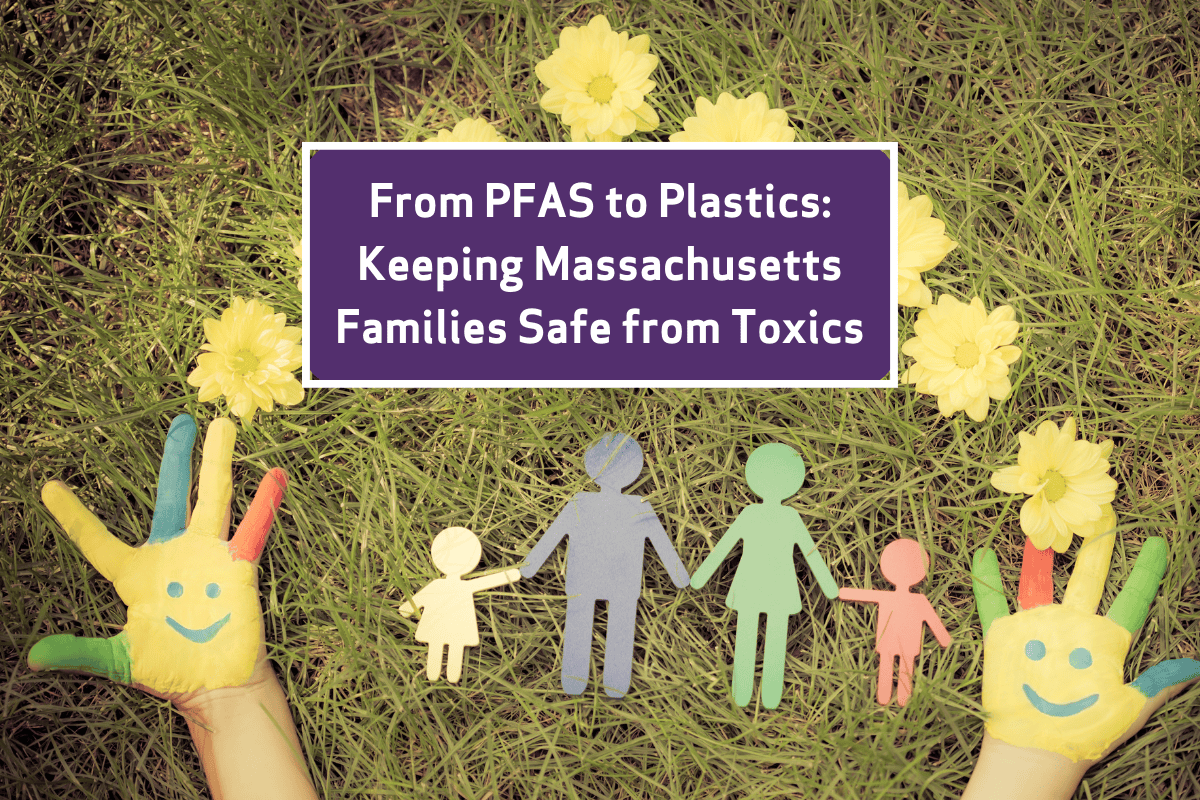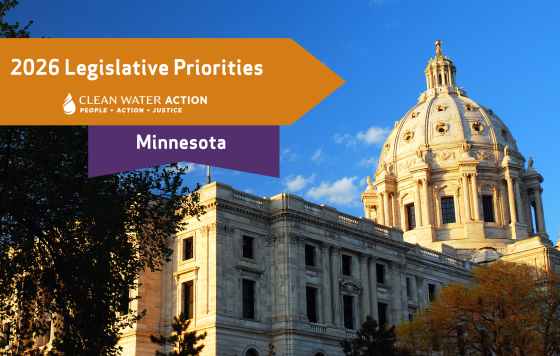
From PFAS to Plastics: Our 2025-26 Toxics Legislative Priorities
It’s really not complicated. We need to know that the water we drink, the food we eat, and the products we bring into our homes are free of toxic substances. Last legislative session, we saw our state elected leaders take steps towards protecting Massachusetts firefighters from toxic PFAS. This session, it’s time to make sure that everyone in Massachusetts is protected from toxic chemicals.
Protect MA Public Health from PFAS
We know. Another scary acronym. So why should Massachusetts join the parade of states passing wide-ranging bans on PFAS (per- and polyfluoroalkyl substances) in common products? Because the more these substances are studied, the more we learn about their adverse health impacts. PFAS do not break down in the environment, so they accumulate in waterways and in our bodies. PFAS can cause significant health harm, increasing the risk of a range of illnesses including several cancers.
That’s why other states - including our neighbors in Rhode Island, New York, Vermont, New Hampshire, Maine, and Connecticut - have already taken action to ban PFAS in children’s products, personal care products, food packaging, firefighting foam, rugs, textiles, and more. Last session, Senator Julian Cyr and Representative Kate Hogan introduced a bill to ban PFAS in these products in Massachusetts, but the bill never came up for a final vote. This session, Sen Cyr and Representative Hogan have reintroduced the bill, and we need our state legislators to pass it, or we risk becoming a dumping ground for toxic products that are illegal to sell in neighboring states.
Toxic Free Kids
Another simple idea – kids' products shouldn’t contain toxic chemicals. Children are especially vulnerable to the impacts of toxic chemicals. But parents and caregivers can’t keep their children safe because the chemical make-up of most products is rarely disclosed. While scientists have identified a wide array of chemicals that are known carcinogens, mutagens, or reproductive and developmental toxics, there are few policies that restrict toxic chemicals from being added to products specifically designed for children.
The Toxic Free Kids legislation offers a simple set of solutions:
- Require businesses to disclose if toxic chemicals are in children’s products.
- Ban PFAS in any product for a child under 12.
- Ban over 70 chemicals that are known to harm children from being used in products for children under 3, children’s personal care products, or anything designed to be put in a child’s mouth.
- Give the state authority to further restrict these 70 chemicals in products for older children.
Last session, the Toxic Free Kids bill was reported favorably out of the Public Health committee for the second time, but it never came up for a final vote. This session, we are building a coalition of parents, teachers, pediatricians, and public health professionals to get it across the finish line.
Protect our soil and farms from PFAS contamination
Farms across the nation have become contaminated with PFAS. Since the 1970s, it has been common practice for governments to send sewage sludge to farms for use as fertilizer. Unfortunately, most sewage sludge has high levels of PFAS, microplastics, and other contaminants. Farms have had to shut down due to PFAS contamination because PFAS in sludge has gotten into crops and into animals that eat crops, and farm families have been found to have very high levels of PFAS in their blood.
This session, the Massachusetts Legislature is considering a bill banning the sale of any soil amendment containing PFAS. The bill would also create a fund to support the testing of farmland for PFAS, help farmers transition to alternative soil amendments, and provide relief and remediation funding to farmers whose land has already been contaminated by PFAS.
Ban on “Chemical Recycling”
Plastics recycling has been an abysmal failure. The petrochemical lobby would have you believe that so-called “chemical recycling” facilities are the solution. They aren’t. Not only are these facilities failing at recycling, but they are also polluting communities. Plastics can contain thousands of different toxic chemicals which are transferred into the air as emissions or into the solid waste byproducts of plastic-to-fuel operations, and these facilities place a heavy toxic burden on communities near these sites as well as near the sites where the byproducts of these processes are ultimately disposed of or burned.
We can’t solve our plastic pollution problems by hiding this toxic process in frontline communities. Our legislators can get ahead of petrochemical lobbyists by setting conditions on these facilities now, requiring them to actually recycle 50% of the plastic that comes into the facility and to put 30 years of liability funding in escrow as a safeguard for host communities. These requirements make it much more difficult for dirty sham recycling facilities to open in our state. The solution to plastic pollution is to make and use less plastic.
Massachusetts families deserve to know that our water, food, toys, clothes, cookware, personal care products, and more are free of toxic substances. Every illness caused by an unnecessary exposure to toxic chemicals is a preventable tragedy.
Take action: Ask your state legislators to co-sponsor these bills!


